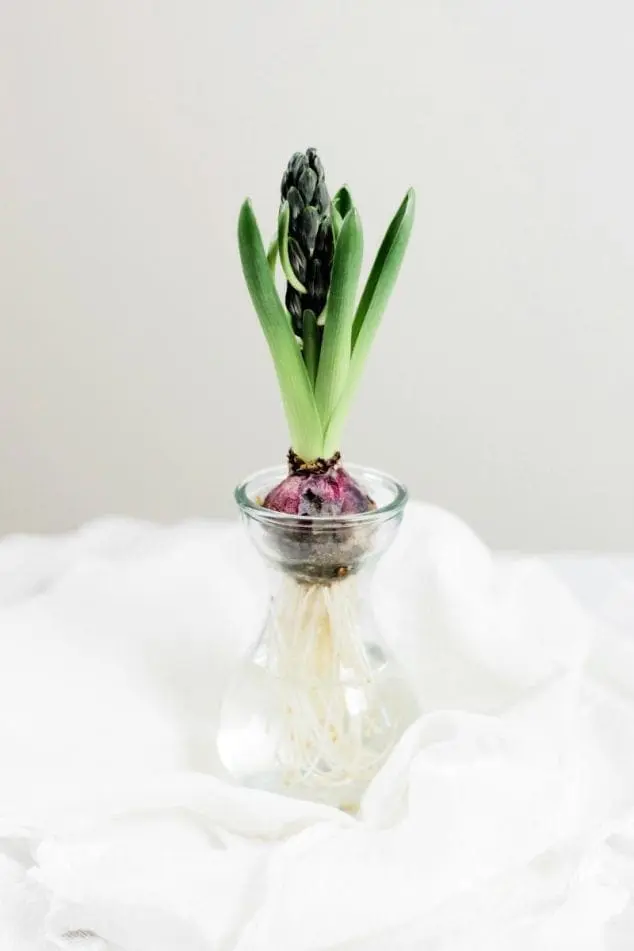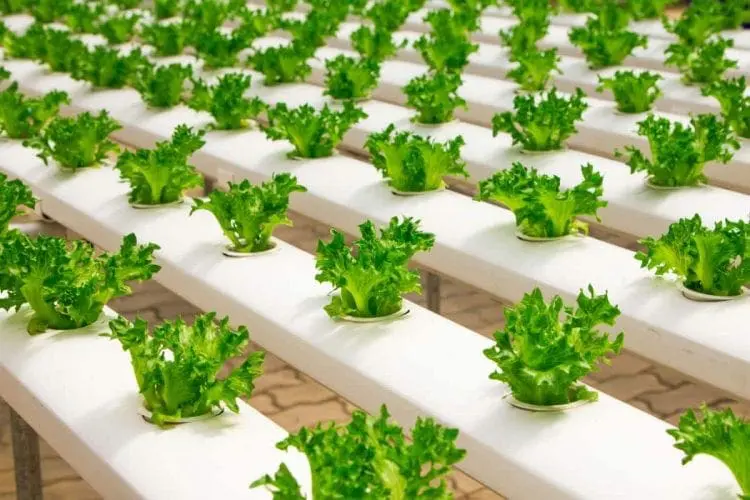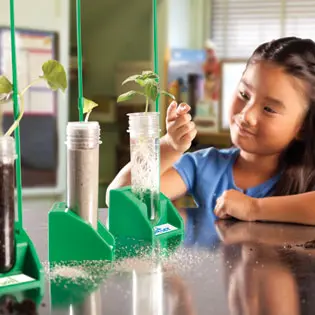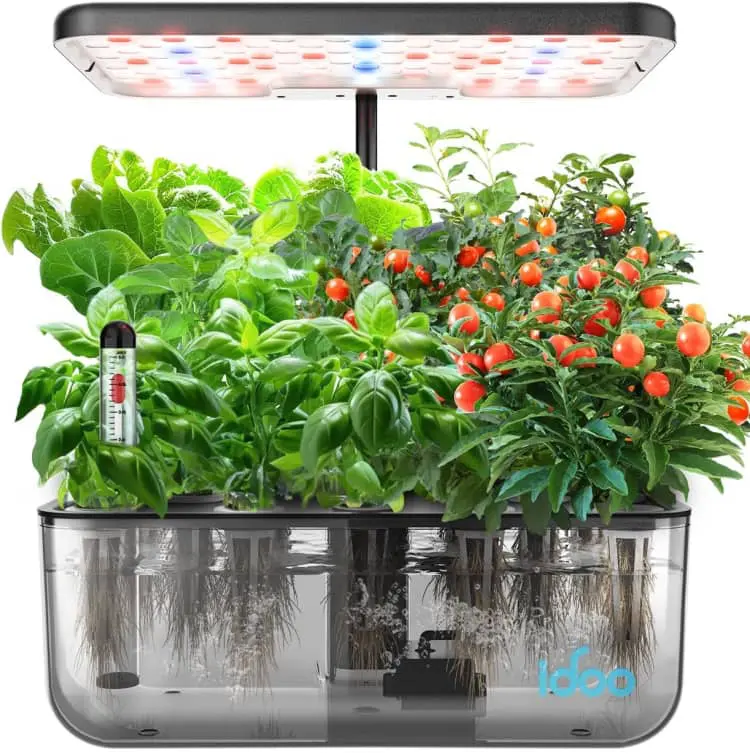We all know how curious kids become when they see something new. Learning and playing go hand-in-hand, especially in the garden. Teaching kids the basics of hydroponics is a great way to introduce them to science concepts in a fun, hands-on way. Hydroponic gardening is a fun and educational activity for kids that can teach them about plant biology, ecology, and sustainable living. They may also learn to love gardening as an added bonus of hydroponics for kids.
Learning About Hydroponics Is Fun
Kids love getting their hands dirty, but unfortunately, there’s none of that with hydroponics; there’s no soil in sight! Learning about hydroponics will take your child’s initial interest in gardening and help them learn about how plants work and how science works.

What is hydroponics for kids?
What are hydroponics exactly? As Study.com says, “Hydroponics is a method for growing plants without using soil. The nutrients that plants need to grow are put into water and then delivered to the roots of the plants.” So hydroponics for kids is all about introducing them to hydroponics and letting them see how it works with their own eyes.
Explaining Hydroponic Systems
There are many different ways to teach kids about hydroponics but they should all involve growing a plant in water. The plant roots are exposed to a nutrient solution directly through the water instead of in the soil. There are two types of hydroponic systems: passive and active. An example of passive hydroponics is one where no energy is used to move the water and necessary nutrients about. For example, when sprouting an avocado seed in water, the pit is simply suspended so that the root systems may grow in still water and the seed itself provides most of the nutrients. In an active hydroponic system, energy (usually supplied by an electricity-powered pump) is used to move the hydroponic solutions around the root zone area and to provide aeration leading to faster, healthier plant growth.
Each of these two hydroponic systems can either be solely water-based or media-based. Water-based systems allow the plant roots to directly access the water, so they need a support material such as wire mesh or toothpicks to keep the plant itself suspended above the water reservoir. Media-based systems use some kind of growing medium, such as gravel, cotton balls, perlite, coconut coir, or rockwool to support the plants and allow the roots to access the nutrient solution. Leafy vegetables like lettuce and herbs tend to do better in a water-based culture. Whereas, heavier, fruiting vegetables like tomatoes, cucumbers, or peppers will do better in a media-based wick system.

Why teach kids about hydroponics?
Teaching kids about hydroponics is a great way to explain that water is a precious resource. This will bring home environmental messages early with them and help develop a curiosity about the world around them. Through this science experiment, kids begin to understand the challenges plants face in the environment; habitat, food supply, ecosystems, reproduction, fertilizers, and disease. These are all important concepts in agriculture and essential learning when it comes to nature and basic biology.
Many kids especially respond to a hands-on approach, so taking them to a hydroponic farming greenhouse is an excellent way to foster children’s learning. It shows how water and sunlight are needed for growth and introduces the science behind plant growth. They also learn where their food comes from and healthy eating habits.
With hydroponics, kids can learn how sunlight is caught by chlorophyll in plants, and then the energy from sunlight is transformed into the nutrients the plant needs to grow. When kids learn that plants breathe differently than we do, their eyes widen with interest. They know we breathe oxygen, but that plants take in carbon dioxide. We breathe in what they produce, showing them how extra important plants are!

Experiments With Hydroponics
You can set up your own hands on hydroponics activities at home. I used to do a basic seed-growing activity with my kids where they would germinate bean seeds in a wet paper towel. They would then observe, record, and sketch the growth on a daily basis. They would learn about the proper names for plant parts and witness the incredible growth rates firsthand. Hydroponics experiments can start off that simple or progress to more complex plant-growing activities.
Another simple idea is to get some flower bulbs and grow them in a small bud vase. This will allow your children to see the roots sprout and grow. I like to do this in the winter with amaryllis and in the spring with hyacinths or tulips.
Older children may enjoy trying out vertical hydroponic systems (especially great for small spaces). It is a good idea to let children experiment with various plant seeds and plant foods to see what achieves the best results and healthy growth. In this science project, they will enjoy finding the optimum water level and water culture for different types of hydroponic plants.
Nutrient Solution Concentration
Objective:
Observe the effects of different nutrient solution concentrations on plant growth.
Materials:
- Several identical plants (e.g., basil or spinach)
- Hydroponic system
- Water
- Nutrient solution
- Measuring spoons
- Labels
Procedure:
- Set up the hydroponic system with multiple containers.
- Prepare nutrient solutions with different concentrations (e.g., 50%, 100%, and 150% of the recommended amount).
- Label each container and plant the seedlings.
- Monitor and record the growth of each plant.
Expected Outcome:
Plants will show varying growth rates based on nutrient concentration, with optimal growth likely at the recommended concentration.
These experiments not only provide hands-on learning but also instill scientific thinking and curiosity in kids.
More Experiments With Hydroponics
You may get some great ideas for creating your hydroponic experiments for kids here:
Simple seed jar science experiment
Hydroponics vs. Soil experiment for faster growth
Hydroponics Science Fair Project

Hydroponic Garden For Kids
Kids love to learn through hands-on projects and with a hydroponic garden for kids, they can learn about hydroponics, plant growth, the water cycle, and photosynthesis all at the same time. A great by-product is that it is sure to promote an interest in vegetables and healthy eating habits too.
Hydroponic Garden Materials Needed:
- Hydroponic System: Choose a simple system like a wick system or a deep water culture (DWC) system.
- Grow Lights: If natural light is insufficient.
- Growing Medium: Options include rockwool, coconut coir, or perlite.
- Nutrient Solution: Specifically formulated for hydroponic systems.
- Water Reservoir: A container to hold the nutrient solution.
- Select Plants: Start with easy-to-grow plants like lettuce, spinach, or herbs.
- Net Pots: To hold the plants.
- pH Testing Kit: To ensure the nutrient solution is at the correct pH level (5.5-6.5).
Alternatively, you may wish to purchase a hydroponic garden kit for kids that is easy to assemble and start growing, like this one through my affiliate Amazon link. What better way to learn hydroponics than to involve kids in every step, from planting seeds to harvesting?
Conclusion
Hydroponics for kids is fun! Encourage your kids to take notes and measure and take photos of their growing plants. This is a fun way to track the growth of their plants. Allowing your kids to develop their own hydroponic system is a great way to increase their basic knowledge and feel pride in their accomplishments. I’d love to hear about your hydroponic experiments. Share pics with #familyfocusblog!
Related Posts:

Robin says
My oldest son LOVES to do these kind of science experiments. Hydroponic gardening with a wick system is a great way to teach about capillary action. Thanks for sharing about what is the importance of hydroponics and how it can teach so many valuable things to children.
Velo says
I love your ideas. I do agree that we have to teach them how precious water is early so they would take it seriously. I am going to try a hydroponics project with my kids. I hear that lettuce seedlings are great for a hydroponic system.
Ann Williams says
I just got a book out of the library about hydroponic vertical systems. I love that there is a kit for kids! Having hydroponic starter plugs will make things so much easier.
blueBriX says
Thanks for this blog. It is great to be able to figure out ways by which kids can be kept entertained in an educational manner. I just order my kids some hydroponic starter plugs so we can add wick and learn about capillary action through simple systems.
Kidzonia says
What a fantastic initiative! At Kidzonia, we believe in hands-on learning, and introducing hydroponics to kids aligns perfectly with our mission to make science engaging and fun. Our students thrive when they can connect classroom concepts with real-world applications.